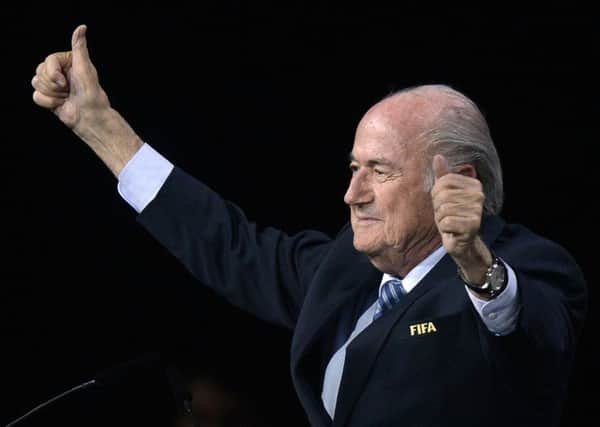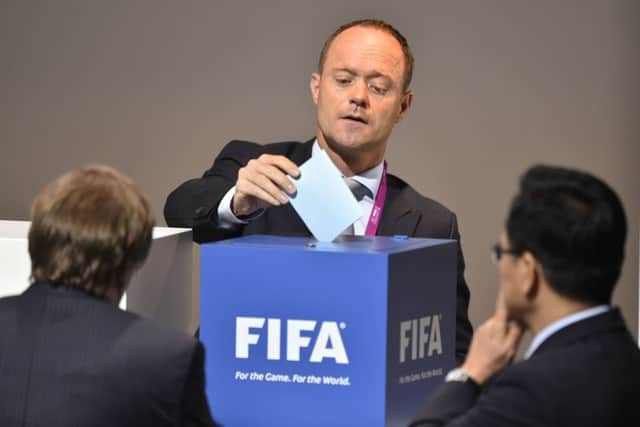Fifa: Football in crisis as Sepp Blatter re-elected


In a move that could see European nations boycott the World Cup and diminish the proud 143-year tradition of international competition, the controversial 79-year-old secured a fifth consecutive term at the helm of Fifa, only to face immediate calls for his resignation. His victory, which came 48 hours after authorities in the US and Switzerland launched criminal probes into widespread corruption and bribery at the embattled organisation, prompted angry responses from influential figures in the sport who described it as a “dark day” for football.
Although Mr Blatter failed to secure the necessary two-thirds majority in the first round of voting at Fifa’s congress, taking 133 votes to the 73 of his only challenger Prince Ali bin al-Hussein, the Jordanian withdrew after it became clear the incumbent was on course to win a majority.
Advertisement
Hide AdAdvertisement
Hide AdOn a day when not even bomb threats at Fifa’s headquarters could dislodge Mr Blatter from office, he showed scant concern for his diminished mandate as he took to the stage in Zurich, clasping his hands and raising them in triumph to deliver a rambling victory speech.
Addressing delegates from the 209-member federations, the Swiss said: “I will be in command of this boat called Fifa and we will bring it back to shore.”
Suggesting this would be his final four-year term in the top job, Mr Blatter vowed to make changes at the scandal-hit body.
He said: “We have some organisational problems. We need women in this committee, we have to do more. I will not touch the World Cup, it is too important. I take responsibility to bring back Fifa; with you we will do it, I am convinced.
“I am a faithful man; now God, Allah or whoever we believe in, they will help us to bring back Fifa. I promise you at the end of my term I will give Fifa to my successor in a strong position.”


Concluding his speech, he added: “I am not perfect but we will do a good job together. Let’s go Fifa, let’s go Fifa!”
Prominent football figures who advocated change bemoaned the outcome. Gary Lineker, the former England international and BBC presenter tweeted: “As predictable as it is depressing. All those members that voted for Blatter have betrayed the game they are supposed to cherish.
“The only way this revolting organisation will change is if the major football federations walk out. It’s time to grow a pair of footballs.”
Advertisement
Hide AdAdvertisement
Hide AdGreg Dyke, the chairman of the English Football Association, said: “This is not over by any means. To quote the US attorney general, ‘This is the beginning of the process, not the end’.
“The idea Blatter could reform Fifa is suspect. I’d be very surprised if he was still in this job in two years.”
Former Portugal international Luis Figo, who pulled out of the race to succeed Mr Blatter last week, described it as a “dark day in Zurich”.
“Fifa has lost but, above everything, football has lost and everyone who truly cares about it has lost, too,” he added. “Mr Blatter had a very cynical reaction when he said that he couldn’t control everyone. These persons, whom Mr Blatter has promoted through the years, turned, with him, Fifa into a decadent organisation.
“If Mr Blatter were minimally concerned about football, he would have given up of the re-election. If he has a minimal of decency, he will resign in the next few days.”
Although Mr Blatter’s win was widely expected thanks to the support he enjoys across swaths of Africa, Asia, Central America and the Caribbean, the repercussions will be far-reaching.
Uefa, the association representing European football, is expected to convene in Berlin next week, where members will discuss its relationship with Fifa.
Its president, former French international Michel Platini, who remained in his seat and did not applaud Mr Blatter’s victory speech, has not ruled out the continent’s teams boycotting the World Cup.
Advertisement
Hide AdAdvertisement
Hide AdStewart Regan, the chief executive of the Scottish Football Association, has said boycotts could be an option for the continent’s nations, suggesting a “rival body” could be established.
Last night, Platini reiterated his desire for change within Fifa, while congratulating 39-year-old Prince Ali for his “admirable campaign”.
He said: “I am proud that Uefa has defended and supported a movement for change at Fifa, change which in my opinion is crucial if this organisation is to regain its credibility.
“I congratulate my friend Prince Ali for his admirable campaign and I take the opportunity to thank all the national associations who supported him.”
Former Manchester United chief executive David Gill, who was appointed to Fifa’s executive committee just hours before the presidential vote, is now expected to resign his post in light of Mr Blatter’s reappointment.
As he enters his eighties, Mr Blatter will have to muster the energy and guile to contend with the corruption inquiries.
He has faced mounting calls to step down over the past 72 hours, after several Fifa officials were among 18 people arrested, as US and Swiss authorities both launched police probes into allegations of kickbacks, bribes and “rampant corruption”.
Yesterday, the Serious Fraud Office said it was actively assessing “material in its possession” relating to the corruption allegations revealed by the FBI. The news comes after bank accounts at Barclays, HSBC and Standard Chartered Bank were allegedly used to transfer cash as part of the conspiracy.
Advertisement
Hide AdAdvertisement
Hide AdThe three British-based banks were named on the indictment released by the US department of justice, which charged 18 people over alleged bribes totalling more than £98 million for television rights, sponsorship deals and World Cup votes.
Prime Minister David Cameron joined the growing chorus calling for the Swiss bureaucrat to resign, warning that “frankly what we have seen is the ugly side of the beautiful game and he should go”.
But speaking before the votes were cast, Mr Blatter outlined his determination to hang on to his job, telling delegates to vote for him and let him “shoulder” the responsibility of fixing the scandal that has engulfed Fifa.
He said: “We don’t need revolutions, but we always need evolutions. Yesterday and the day before and even today I am being held accountable for the current storm.
“So be it: I will shoulder that responsibility, I will take it. I’ll accept this responsibility and I want to fix Fifa together with you.”
COMMENTARY
Wily old fox gets tactics just right to ensure he is always the winner
CASUAL observers of the beautiful game may be surprised at the way Sepp Blatter was able to hold on to the reins of power at Fifa in the face of the twin investigations by authorities in the United States and Switzerland, but seasoned followers of the organisation’s internal machinations will be less surprised.
Since his appointment as Fifa’s technical director in 1975, Mr Blatter has sought to consolidate his standing within Fifa with a system of patronage, favouring the smallest nations and territories, that many have come to regard as the crassest kind of pork barrel politics.
Advertisement
Hide AdAdvertisement
Hide AdWhereas Fifa’s membership stood at just 141 four decades ago, its ranks have swelled to 209, 16 more than the membership of the United Nations.
This number includes members who are not even countries, such as the US Virgin Islands, an organised, unincorporated American territory in the Lesser Antilles, and New Caledonia, a sun-kissed French territory in the clear blue waters of the Pacific.
Neither is particularly well known for their triumphs in the sport down the years, but they enjoy the same democratic influence at a Fifa congress as footballing powerhouses such as Germany, Spain and Brazil.
Mr Blatter has also ensured the fledgling football programmes of small nations are well resourced by Fifa, a cash-rich organisation that has reserves of nearly £1 billion.
The desire to encourage smaller nations to bolster their footballing presence is, on the face of it, a commendable exercise, but Fifa’s allocation of funding via its Goal development programme – which has dished out more than £200 million since 1999 – also ensures Mr Blatter can rely on a loyal band of supporters among the 209 member federations, especially those in Africa, Asia, the Caribbean and Oceania.
Only last month, Mr Blatter enjoyed a rapturous reception in the Dominican Republic, where Osiris Guzman, president of the national FA, compared the Swiss to Jesus, Moses, Lincoln, Churchill and Mandela.